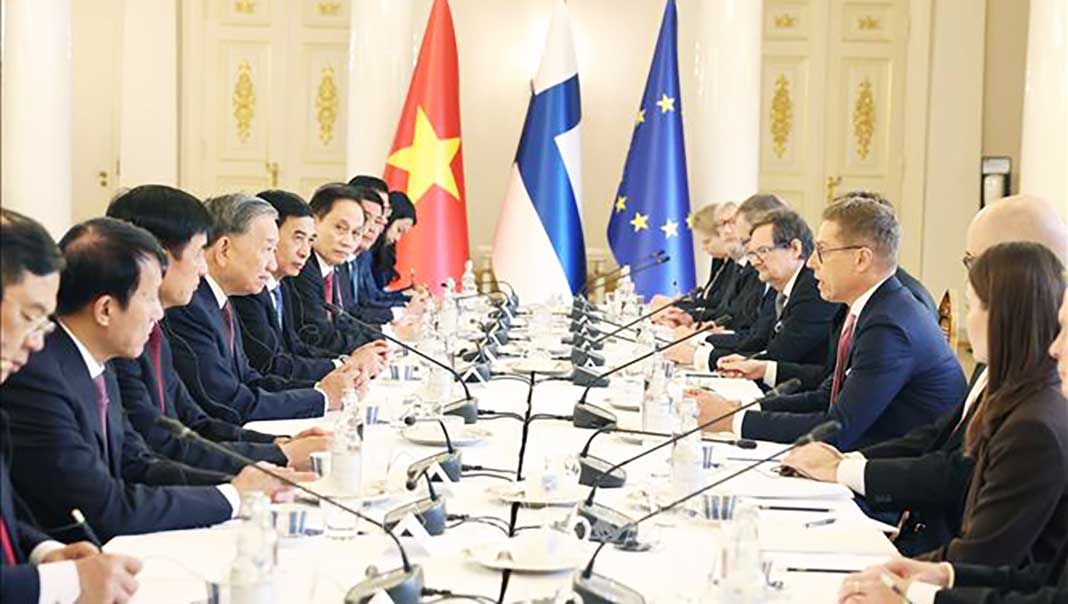HCMC – Vietnam and Finland have issued a joint statement announcing the official elevation of their bilateral relations to a strategic partnership, the local media reported.
The statement says that the two countries recognize the significant achievements in their ties, reaffirm key principles, and outline major directions to strengthen cooperation and further develop their traditional friendship and strategic partnership for the long-term benefit of the two peoples, as well as for peace, stability, cooperation, and sustainable development in each region and globally, said the Government of Vietnam news website (baochinhphu.vn).
The statement was issued on the occasion of the October 20-22 official visit to Finland by General Secretary of the Communist Party of Vietnam To Lam and his spouse.
On the morning of October 21 (local time), right after the welcome ceremony at the Presidential Palace, Party General Secretary To Lam held talks with President of Finland Alexander Stubb.
President Stubb affirmed that the visit marked an important milestone in the history of bilateral relations, emphasizing that despite global uncertainties, ties between the two countries have continued expanding.
He highly valued the first official visit by a General Secretary of the Communist Party of Vietnam to Finland since the establishment of diplomatic relations in 1973, reaffirming that Finland attaches great importance to developing relations with Vietnam — its most important trading partner in Southeast Asia.
President Stubb also expressed admiration for Vietnam’s remarkable socioeconomic development achievements in recent years, describing Vietnam as a success story. He expressed his hope that the visit would open up new opportunities for cooperation in various potential areas.
Party General Secretary Lam congratulated Finland on its outstanding socioeconomic accomplishments and highly appreciated the country’s foreign policy and international cooperation efforts aimed at promoting sustainable development and shared prosperity.
He reaffirmed that Vietnam treasures its traditional friendship with Finland and remains grateful for Finland’s support in Vietnam’s reconstruction and development. He expressed the hope that Finland will continue to be a reliable partner and companion in Vietnam’s new development era. Lam also conveyed greetings from Vietnam’s senior leaders and extended an invitation for President Stubb to visit Vietnam.
During their talks, the two leaders discussed major strategic directions to elevate bilateral relations to match their potential and scope. Both sides agreed to boost cooperation in various areas — particularly those identified as priorities for future collaboration — including circular economy, green transition, sustainable maritime cooperation, digital transformation, environmental protection, and climate change response.
Both sides agreed to make full use of the EU–Vietnam Free Trade Agreement (EVFTA) to facilitate business exchanges and partnership opportunities, especially in agriculture and consumer goods.
General Secretary To Lam said that Vietnam welcomes and creates favorable conditions for Finnish businesses to do business in the country. He affirmed Vietnam’s readiness to work with Finland as a bridge to the European Union (EU) and the Association of Southeast Asian Nations (ASEAN) markets, thereby promoting stronger Vietnam–EU and Finland–ASEAN cooperation in the coming time.
He also urged Finland to encourage the remaining seven EU member states to ratify the EU–Vietnam Investment Protection Agreement (EVIPA) soon and to advocate for the European Commission (EC) to remove the IUU yellow card imposed on Vietnam’s seafood exports.
He invited Finnish enterprises to expand investment in areas where Finland has strengths, such as green technology, processing industries, energy transition, and logistics services.
For his part, President Stubb affirmed that Finland is ready to cooperate with Vietnam in areas where the two sides share mutual interests and strengths, including circular economy, forestry, science and technology, education and training, and climate change adaptation.
Regarding regional and international issues, including regional security, both sides underlined the importance of maintaining peace and stability worldwide, supporting the settlement of disputes by peaceful means and in accordance with international law, while calling for restraint and an end to conflicts.
On the East Sea issue, the two sides reaffirmed their support for ASEAN’s common stance on freedom of navigation and overflight, and the peaceful settlement of disputes based on international law, particularly the 1982 United Nations Convention on the Law of the Sea (UNCLOS 1982), thereby contributing to peace and stability in the region and beyond.









